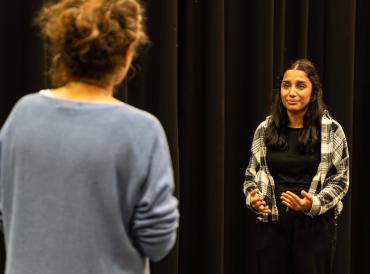Graded Exams for Performance: Devising Drama

About the exam
For those that want to make their own work, our Devising Drama exams allow learners to create their own scenes from scratch.
Provided with a list of themes to pick from, learners create the characters and write the scripts themselves. As they progress to the higher grades, learners will develop an understanding of dramatic structure and staging, using movement and mood, style and space. For their Level Three exams, learners will also perform short improvised scenes – unplanned and unscripted.
Learners can either take their Devising Drama exams by themselves (solo) or in a pair with a fellow learner (duologue).
All Devising Drama - Solo exams are available online.
LAMDA is recognised to award qualifications on the Regulated Qualifications Framework (RQF) in England by the Office of Qualifications and Examinations Regulation (Ofqual), in Wales by Qualifications Wales (QiW), and in Northern Ireland by the Council for the Curriculum, Examinations and Assessment (CCEA).
What does the exam involve?
Type of exam: Solo or Duologue
Time allowance: Solo: 10 minutes, Duologue: 15 minutes
- Devising and performing one scene as detailed in the syllabus
- Answering questions related to their performance
Please see the LAMDA Performance Graded Examinations Syllabus (2024)
Type of exam: Solo or Duologue
Time allowance: Solo: 15 minutes, Duologue: 25 minutes
- Devising and performing two scenes as detailed in the syllabus
- Answering questions related to their performance
Please see the LAMDA Performance Graded Examinations Syllabus (2024)
Type of exam: Solo or Duologue
Time allowance: Solo: 20 minutes, Duologue: 30 minutes
- Performing two scenes devised by the learner, as detailed in the syllabus
- Answering questions related to their performances
Please see the LAMDA Performance Graded Examinations Syllabus (2024) for full details.
Type of exam: Solo or Duologue
Time allowance:
Grades 6 & 7: Solo: 25 minutes, Duologue: 35 minutes
Grade 8: Solo: 30 minutes, Duologue: 40 minutes
Performing:
- two scenes devised by the learner as detailed in the syllabus
- one short, improvised scene based on a stimulus provided by the examiner
- answering questions related to their performances
Please see the LAMDA Performance Graded Examinations Syllabus (2024) for full details.
Requirements
Full details of the requirements, assessment criteria and regulations for each grade can be found in the LAMDA Performance Graded Examinations Syllabus.
2024 (in effect for examinations from 1 August 2024)
As part of the 2024 Syllabus update, Learners are able to perform all pieces in the new Acting Anthology Volume 5 and previous Acting Anthology Volume 4, and all pieces in the new Verse and Prose Anthology Volume 20 and Verse and Prose Anthology Volume 19, for first assessment from 1 August 2024.
Resources & Teaching Materials
Explore our FAQs to find out more about our syllabi and qualifications.
All our syllabi listed below are available for free via download, or you can purchase our full range of publications from our online shop.
You will need:
- Teacher support material available via the Download Centre.
- Performance Graded Examinations Syllabus from August 2024 (for examinations from 1 August 2024)







